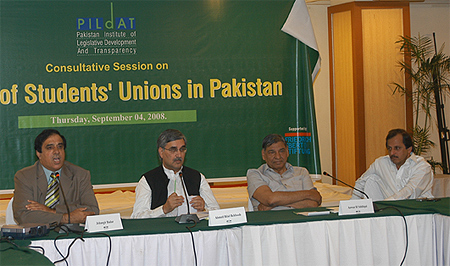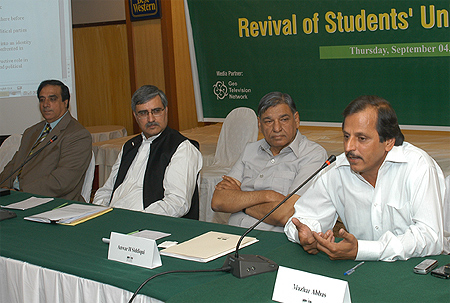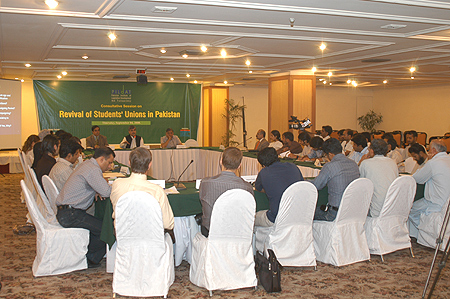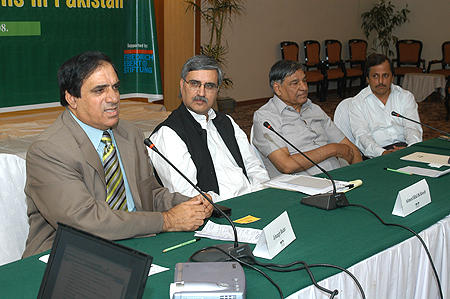|
|
| |
| EVENTS |
|
|
> Systematic and Urgent Revival of Students Unions Stressed
|
| |
|
First Consultative Session
September 04, 2008
Best Western Hotel, Islamabad
|
|
| |
Islamabad, September 4; The PILDAT-organised Consultative Session on the Revival of Students Unions concluded that a systematic and urgent revival of Students Unions is needed. Whereas the view remained divided whether or not political parties should have any linkage with Students Unions, with most participants against any apparent or otherwise political association, it was highlighted that students, as any other citizens of Pakistan, are well within their constitutional rights to align themselves ideologically to any political party or group. However, Students Unions, as forums of leadership development, should remain away from partisan party-based politics. |
|
| |
PILDAT organised the first Consultative Session of what it aims to be a series on the topic of Revival of Students Unions in Pakistan, at Islamabad. The consultative session got together a wide variety of stakeholders: senior representatives of major political parties, academic institutions, Members of Parliament, Media Associations, Students and representatives of the civil society organisations who debated and considered key questions relating to the revival of students unions laid out in the form of a PILDAT Discussion Paper especially prepared on the topic by PILDAT. Prominent among the participants were Mr. Jahangir Badr, Secretary General PPP, Mr. Mazhar Abbas Secretary General of the Pakistan Federal Union of Journalists and representatives from the Higher Education Commission in addition to Members of Parliament.
|
|
| |
For a healthy and systematic working of the Students Unions, it is necessary that political parties do not use students groups and associations as their proxies on campuses, thus came another consensus of the session. However, it was also pointed out that at the time when political linkages of parties with students groups were at their peak, that was a time of strong political stifling of the political process in the country. Parties, therefore, resorted to using students groups as their proxies. Given that the political process has undergone a transformation and liberalisation, there are lesser reasons today for political parties to consider using students groups as their proxies. Nevertheless, personal and group ideologies of students aside, unions, as elected representative bodies of the students at campuses must not espouse or have any political linkages whatsoever. |
|
| |
Representatives from the Government and the HEC also shared that a draft bill was ready to regulate functioning of the students� unions currently being vetted by the Law Ministry for introduction in the Parliament. However students and other stakeholders strongly criticised the non-inclusive manner in which such an important legislation was prepared without getting on board the views of stakeholders. |
|
| |
There was also agreement that a comprehensively debated, transparently drafted and unanimously acceptable Code of Ethics must be there for the orderly revival of Students� Unions. For students unions to achieve their prescribed goal of leadership development for the future, it is necessary that tolerance and acceptance of differences based on ethnic, communal and sectarian grounds are accepted as a principal in these bodies. |
|
| |
Speaking on the occasion, Secretary General PPP Mr. Jehangir Badr said that Student organisations aim to measure up to political parties which is a very wrong approach and quite contrary to how Students� Unions used to function back in 1960s. Unions have a broad-based, significant and very constructive role to play in the political character building of the students and this must not be graduated by the defective yardstick of our national politics. |
|
| |
Dr. Anwar H Siddiqui, President, International Islamic University strongly suggested that the Bill drafted by HEC on the proposed Code of Ethics and Modalities of Students� Unions, must be publicised and widely debated upon. He also said that the criteria of selection for the committee members should have been based on competitive terms, in a transparent manner. He further deliberated upon the role of Students Unions in the administration of the Universities and said that this should be left to the seasoned academicians as they are at greater wisdom on what is best for the students academically. However, their right to expression of opinion should be protected and endorsed fully. He said that Vice Chancellors across the country are fearful of the revival of Students Unions because of the violent incidents and subsequent impediments in the running of the university. |
|
| |
Mr. Mazhar Abbas believed that students� unions ought to be revived with a spirit that its pros are indispensable and invaluable. He said that violence prevails in the entire society and is not a peculiar element of students� unions alone. |
|
| |
The consultative session also discussed the question of ambiguity of the legal status of ban on students unions, especially after the policy announcement of the Prime Minister.
PILDAT Executive Director Mr. Ahmed Bilal Mehboob, who conducted the discussion, also announced that the consultative process started with Islamabad will also include consultations organised by PILDAT in various cities of the country at the conclusion of which recommendations will be shared with the Government. |
|
| |
|
|
| |

|
|
| |
|
|
| |

|
|
| |
|
|
| |

|
|
| |
|
|
| |

|
|
|
|
|
|
|
|
|